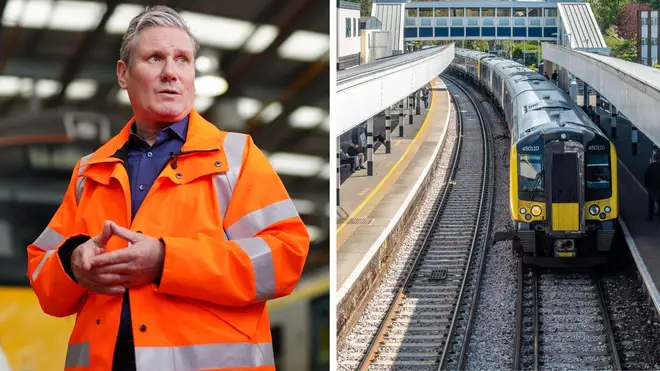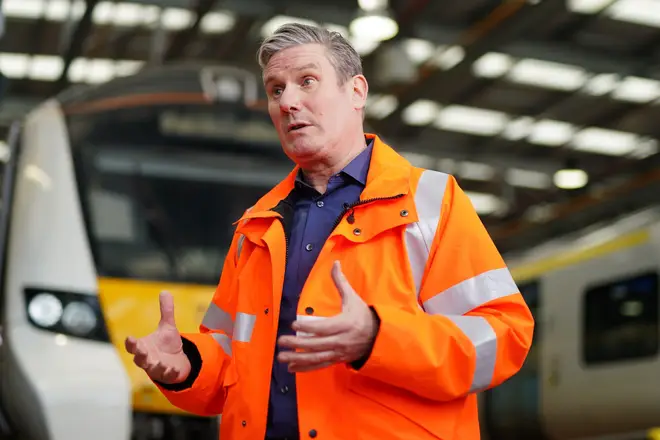
Ali Miraj 12pm - 3pm
24 April 2024, 22:43 | Updated: 24 April 2024, 23:56

Labour will pledge to nationalise the railways “without the taxpayer paying a penny in compensation costs” if they are elected, the party is expected to announce on Thursday.
The party would transfer all rail networks to public ownership within its first term in what it has labelled the “biggest overhaul to our railways in a generation”.
They will transfer the railways to public ownership by folding existing private passenger rail contracts into a new body as they expire, shadow transport secretary Louise Haigh will say on Thursday.
The Government’s proposal for rail reform, which was published in a draft Bill in February, includes the creation of a new public sector body named Great British Railways (GBR).
The GBR would be responsible for rail infrastructure and awarding contracts to operate trains.
However, a Labour government would create a "unified, publicly owned, accountable and arm's length" version of Great British Railways (GBR) led by rail experts rather than Whitehall.
Ms Haigh will say during the announcement: “With Labour's bold reforms, a publicly owned railway will be single-mindedly focused on delivering for passengers and will be held to account on delivering reliable, safe, efficient, accessible, affordable and quality services.
"Labour's detailed plans will get our railways back on track; driving up standards for passengers, bringing down costs for taxpayers, driving growth and getting Britain moving."
Read more: Angela Rayner brands Rishi Sunak 'pint-sized loser' during feisty exchange during PMQs

The party would also establish a watchdog, the Passenger Standards Authority, to hold GBR to account.
It comes after previous estimates by the Government in 2021 that it could save £1.5 billion annually, after five years, by ending inefficiency and fragmentation in railways.
But Labour analysis shows that renationalising the railways could save money by cutting out franchise bidding costs, reducing the duplication of resources and lessening friction between operators.
The party also plans to bring in automatic delay and cancellation refunds, make digital season tickets available on all networks, and make timetables, tickets and fares more integrated.
Former British Airways chief executive Keith Williams, who previously conducted a review of Britain’s railways, welcomed Labour’s plans.
He said: “I welcome Labour's intention, if they are elected, to take forward the substance of my recommendations to deliver a better railway for passengers and freight by creating a rail body with an integrated profit and loss account, at arm's length from government.”
Mick Whelan, general secretary of Aslef, said: "We have seen more positivity in this stunning Labour Party vision for rail than anything at any time from the Tories during their failed privatisation and subsequent incoherent rail reform programme.
"The Labour commitment delivers for the economy, for the taxpayer, for passengers, and for staff."

Mick Lynch, general secretary of the Rail, Maritime and Transport union said: "Labour's commitment to bring the train operating companies into a new unified and publicly owned rail network is in the best interests of railway workers, passengers and the taxpayer."
He added: "This announcement however should be a first step to completely integrating all of our railway into public ownership."
Rail minister Huw Merriman criticised Labour's plans, claiming only the Tories had "a plan to continue investing record amounts in our rail network".
He added: "Labour have confirmed they would push forward with their pointless, unfunded rail nationalisation that will do nothing to improve train reliability or affordability for passengers.
"Just like their unfunded £28 billion a year decarbonisation promise, they don't have a plan to pay for the bill attached to their rail nationalisation. Without a plan to pay for this, it means one thing: taxes will rise on hard working people."
Labour's plans would still leave a role for the private sector on Britain's railways.
Open access operators, like Hull Trains and Lumo, will be able to continue to compete to improve the offer to passengers, the party said.